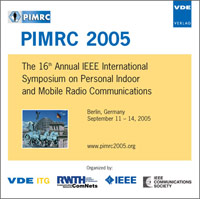Reconfigurable Implementation Issues of a Detection Scheme for DS-CDMA High Data Rate Connections
Conference: PIMRC 2005 - 16th Annual IEEE International Symposium on Personal Indoor and Mobile Radio Communications
09/11/2005 - 09/14/2005 at Berlin, Germany
Proceedings: PIMRC 2005
Pages: 5Language: englishTyp: PDF
Personal VDE Members are entitled to a 10% discount on this title
Authors:
Krikidis, Ioannis; Naviner, Lirida; Danger, Jean Luc (Ecole Nationale Supérieure des Téléecommunications, Department COMELEC, 46, rue Barrault, 75634, Cedex 13, Paris, France)
Abstract:
In this paper a reconfigurable implementation for the data detection in high data rate direct sequence code division multiple access (DS-CDMA) connections is presented. Due to some well defined real time system parameters, traditional implementations of this detector which deal with the mean operational case are not optimal. They consume a lot of power in the favorable operational cases and they loose a diversity gain in the worst cases. Thanks to reconfigurability, a detector can adapt its configuration to each operational condition. Reconfigurability can perform jointly performance and computational power optimization. Implementation issues have shown that the traditional DSPs provide a high degree of flexibility but they are inefficient for the high rate processing constraints involved to DS-CDMA detection with low spreading factors (SF). A reconfigurable hardware implementation is proposed and analyzed which besides its performance capabilities provides a minimum area overhead.


